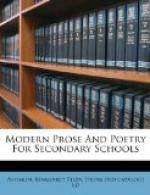ROAD-HYMN FOR THE START
WILLIAM VAUGHN MOODY
Leave the early
bells at chime,
Leave the kindled
hearth to blaze,
Leave the trellised panes
where children linger out the waking-time,
Leave the forms of sons and
fathers trudging through the misty ways,
Leave the sounds of mothers
taking up their sweet laborious days.
Pass them by!
even while our soul
Yearns to them
with keen distress.
Unto them a part is given;
we will strive to see the whole.
Dear shall be the banquet
table where their singing spirits press;
Dearer be our sacred hunger,
and our pilgrim loneliness.
We have felt the
ancient swaying
Of the earth before
the sun,
On the darkened marge of midnight
heard sidereal rivers playing;
Rash it was to bathe our souls
there, but we plunged and all was done.
That is lives and lives behind
us—lo, our journey is begun!
Careless where our face is
set,
Let us take the
open way.
What we are no tongue has
told us: Errand-goers who forget?
Soldiers heedless of their
harry? Pilgrim people gone astray?
We have heard a voice cry
“Wander!” That was all we heard it say.
Ask no more:
’tis much, ’tis much!
Down the road
the day-star calls;
Touched with change in the
wide heavens, like a leaf the
frost winds touch,
Flames the failing moon a
moment, ere it shrivels white and falls;
Hid aloft, a wild throat holdeth
sweet and sweeter intervals.
Leave him still
to ease in song
Half his little
heart’s unrest:
Speech is his, but we may
journey toward the life for which we long.
God, who gives the bird its
anguish, maketh nothing manifest,
But upon our lifted foreheads
pours the boon of endless quest.




